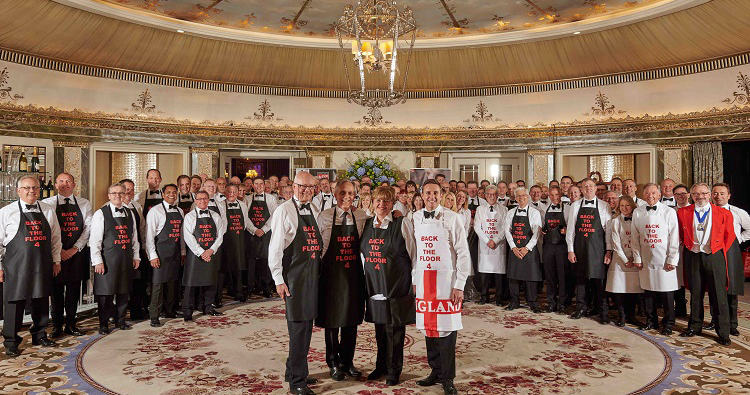
Mark Lewis is the current CEO of the charity Hospitality Action. Mark’s family home was in Maidenhead, situated close to Boulter’s Lock by the river Thames. So it was a trip down memory lane for Mark to be at Roux at Skindles, next to Maidenhead bridge on the opposite bank of the river, in the redeveloped grand old hotel building of one time fame, fortune and mixed repute, less than half a mile from his childhood home.
On this particular evening, Michel Roux Snr and Brian Turner were ‘in conversation’ over food, wine and Jazz, in the beautiful, contemporary bar found upstairs at the new eaterie. These two legends of the industry were working with Mark to host a charity dinner.
At the turn of the 1990s, Mark’s career begun as a travel writer, including responsibility for the Rough Guides to Malaysia, Vietnam and Singapore. Having decided to settle down in the UK, Mark started a long association with Reed Publishing, initially working at Computer Weekly before making the 2004 move across to Caterer Magazine. Mark started at Caterer as deputy editor before rising within a couple of years to editor and then from 2012 onto the role of publisher.
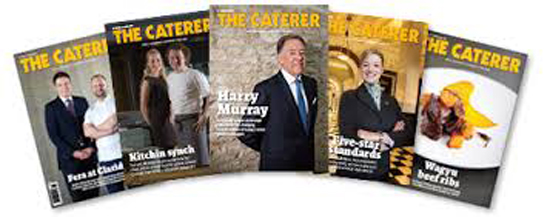
Overall, Mark has invested fifteen plus years in working closely with the hospitality industry, developing a strong industry understanding combined with a broad network that has naturally provided the perfect platform for his current role with Hospitality Action. Indeed for the last decade of his time at The Caterer, Mark was also on the board of trustees of Hospitality Action. So in 2017, when Mark’s predecessor Penny Moore decided to retire, the role of CEO of Hospitality Action was one that Mark could naturally add significant value to, as Mark suggests, “along with the industry knowledge and network, I am writer by trade and telling compelling stories of peoples experiences is a key part of communicating the message of the charity.”
The beginnings of Hospitality Action are to be found in 1837 via the coffee shop owners of the day. This was a time predating modern restaurants and these owners were not focused on the business of charity but looking at pulling together a communal pension pot. As the age of Victorian Britain progressed and the notion of philanthropy spread, so the pension pot became more charitable in the recognition of a duty of care to employees. Over time hotels, restaurants, bars, pubs and food service have all fallen under the umbrella of hospitality and so relevant to the charity.
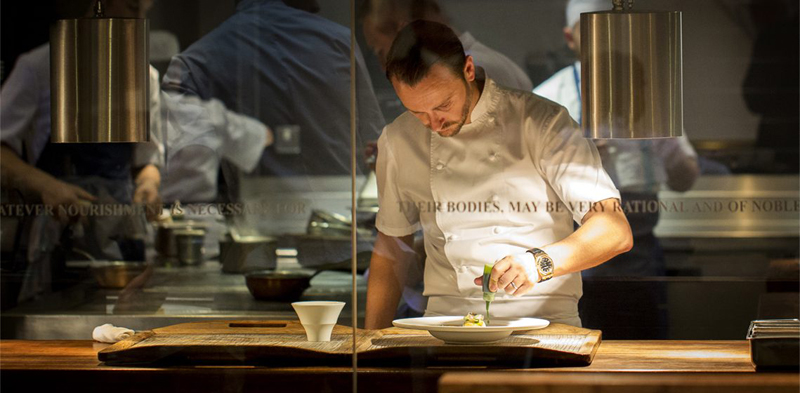
In recent decades the charity has now moved away from a portfolio of property and into providing a raft of products from an Employee Assistance Programme (EAP) through to the delivery of grants to help people. The Hospitality EAP is an outsourced full service offering with significant adopters like Whitbread and Costa among 250 business clients large and small. The cost is £5 per person per year to the company, who absorb the cost centrally as part of the welfare benefits to staff. Historically, Hospitality Action support has been reactive to those that had existing acute challenges. Poverty, physical and mental health issues are the most common challenges. The Hospitality EAP is designed to offer help to prevent the problems becoming acute, so to both assist the welfare of staff and help the employer maintain a happy, healthy and productive workforce.
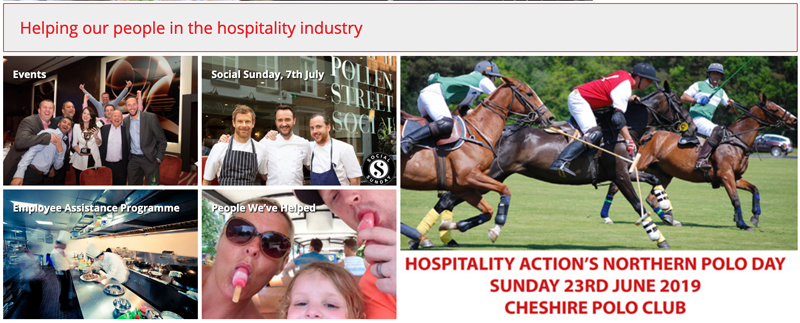
At the other end of the spectrum the charity offers a contact scheme aimed primarily at the retired called Golden Friends, providing events like group afternoon tea gatherings, lunch trips through to contact via newsletters, birthday and Christmas cards. All of which helps keep loneliness at bay later in life.
Family Days Out is an event programme where the charity recognises the knock on impact to the family unit of hard times affecting the hospitality worker. So, to support the family unit to have days out together, events like family theatre or cinema trips with some pocket money are granted to provide much welcomed support.
The general awareness in the industry of the existence, work and projects of Hospitality Action may be ready to take the next step, today these are fairly well understood in the more senior echelons of the industry. The success of events such as Back to the Floor (See pic Top), Social Sunday and In Conversation with Michel Roux Snr are
To go some way to remedy, there are bodies that represent the industry such as

There are natural movements in the world that are helping as the lines continue to blur between the hospitality industry and the wider public. What does this mean? Consider for instance, thirty years ago when waiters were at arms length and a chef never appeared out of the kitchen. In contrast recent years have witnessed the rapid growth in the awareness and accessibility of personalities in the industry. The role of television and modern social media has been extraordinary in changing the dynamic of the public to industry relationship. Naturally those key personalities have an opportunity to use their enhanced voice to support causes such as Hospitality Action: From top end chefs like Jason Atherton, Tom Kerridge, Heston Blumenthal, Michel Roux Snr and Brian Turner who are all strong charity Patrons and advocates.
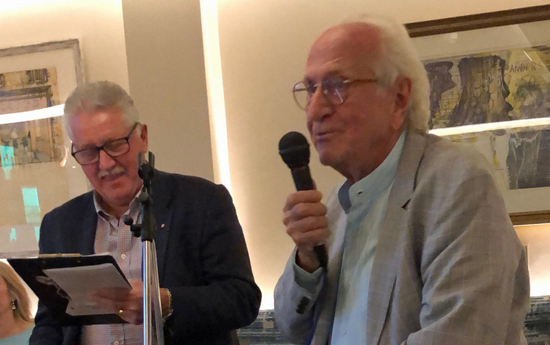
Beyond this, the UK have seen a cultural change epitomised by the general trend away from formality to a more relaxed, informal and inclusive hospitality experience, which engages the general public more effectively with the industry and creates that desired natural empathy with industry charities like Hospitality Action. “An example is tonight where the guests have been delighted to hear from industry legends and great Patrons like Michel Roux Snr and Brian Turner but moreover, from the feedback I’ve heard, those guests have a much more natural understanding and empathy for the charity they are supporting,” reflects Mark.
Looking ahead, a partial brand refresh is afoot that is to involve, as Mark puts it, “surrounding the industry by being visible where those most in need can find us” such as delivering the hospitality equivalent of the Samaritans poster at the end of Clapham Junction station, “which may be from arranging with suppliers to have The Hospitality Action details printed on the blue paper towelling used to wipe down surfaces in kitchens up and down the country. That would be our equivalent of that poster,” considers Mark.
There are around 3.2 million people in the hospitality industry in this country and the charity raises approximately £2m per annum. The scope for greater involvement and touch is a clear objective and with the passion, knowledge and skill set of Mark Lewis leading Hospitality Action forward it will only go from strength to strength through his tenure, making a positive mark on a 182 year old charity before passing the baton to the next custodian of the good works of such a worthy charity.



